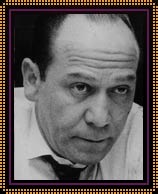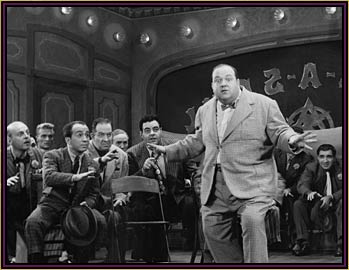 Composer and lyricist, was born Francis Henry Loesser in New York City, the son of Henry Loesser, a pianist, and Julia Ehrlich. His father, who had been an accompanist for the soprano Lilli Lehmann, gave his children a strong musical upbringing. (Frank’s older brother, Arthur, became a pianist, critic, and educator.) But even as a child Frank was aggressively lowbrow: his first lyrics were set to the rhythms of the elevated trains, and he took pride in winning third prize in a citywide harmonica contest. Years later, the Loesser family would remark that Frank’s songs were “very nice, but of course they’re not music.”
Composer and lyricist, was born Francis Henry Loesser in New York City, the son of Henry Loesser, a pianist, and Julia Ehrlich. His father, who had been an accompanist for the soprano Lilli Lehmann, gave his children a strong musical upbringing. (Frank’s older brother, Arthur, became a pianist, critic, and educator.) But even as a child Frank was aggressively lowbrow: his first lyrics were set to the rhythms of the elevated trains, and he took pride in winning third prize in a citywide harmonica contest. Years later, the Loesser family would remark that Frank’s songs were “very nice, but of course they’re not music.”
Bored with formal education (he flunked out of the City College of New York in 1925, his first year), Loesser tried newspaper work, cartooning, advertising, press agentry, and radio writing. His great pleasure, though, was writing verses for others’ music, a few of them performed in Lions Clubs and other inauspicious places. These were difficult years. Loesser occasionally sold songs, but his first show, the “Illustrators’ Revue” (1936), closed in four nights. For a time he resorted to such jobs as screwing the tops onto insecticide bottles.
In 1935, Loesser performed in a club with a singer called Lynn Garland (born Mary Alice Blankenbaker). They were married on Oct. 19, 1936; they had two children. In 1936, Loesser signed a contract with Universal Films and left for Hollywood, a year later switching to Paramount. He remained in Hollywood until World War II, his reputation as a fine lyricist (at least for novelty numbers) rising very quickly. Among the dozens of songs for which Loesser provided the words in those years were “Two Sleepy People” and “Heart and Soul,” with Hoagy Carmichael; “Blue Nightfall,” “Dancing on a Dime,” and “The Lady’s in Love with You,” with Burton Lane; and such others as “Snug as a Bug in a Rug,” “Sand in My Shoes,” “Jingle, Jangle, Jingle,” and “The Boys in the Back Room.”

Stubby Kaye in Loesser's matchless musical "Guys and Dolls."
During World War II, Loesser served in the Army air force but continued to contribute timely lyrics (such as the winsome “They’re Either Too Young or Too Old”) for films and for isolated songs expressive of the new wartime sensibility. Seizing on the watchcry of Pearl Harbor, Loesser wrote “Praise the Lord and Pass the Ammunition,” which came to be to World War II what “Over There” had been to World War I. Shortly thereafter came the moving “Ballad of Rodger Young” and the characteristic Loesser “gripe” song “What Do You Do in the Infantry?” Not only was Loesser suiting his lyrics to the mood of the times, but he was now doing so to his own music, following Jerome Kern’s advice: “Your lyrics make the writing of melody a cinch.”
After the war, Loesser returned to writing for films and for Tin Pan Alley, now exclusively his own collaborator. Among his songs from those years are “What Are You Doing New Year’s Eve?”, “On a Slow Boat to China,” and, for the film NEPTUNE’S DAUGHTER, “Baby, It’s Cold Outside,” which won him the 1949 Academy Award for best song. In RED, HOT, AND BLUE (1949) he made his only screen appearance. Despite these successes, Loesser wanted “to create situations” rather than songs: “Songwriting is a little thing and I settled for a big thing.” The “big thing” was the Broadway musical, and Loesser never again wrote single songs. His “Where’s Charley?” (1948), which ran over two years, surprised those who had doubted Loesser’s ability to craft an integrated musical score on his first try. But “Where’s Charley?” paled in comparison to his “Guys and Dolls” (1950), universally recognized as among the greatest of all Broadway musicals. Loesser found the eccentric idioms of the Damon Runyon characters (in Abe Burrows’ script) ideal for his colloquial lyrical style, but the great accomplishment was suiting each song to the character who performs it; the songs here are as important as the book in depicting character and propelling plot.
Loesser never doubted that he could amuse, but he felt that touching an audience required more dexterity. His next endeavors moved him in that direction. In 1952 came his only complete film score, composed for Samuel Goldwyn’s HANS CHRISTIAN ANDERSEN; its romantic ballads and children’s songs have the ardor and Old World charm of the film. Then, returning to Broadway, he created his most ambitious work, “The Most Happy Fella” (1956). This musical, for which Loesser wrote the book (based on Sidney Howard’s play “They Knew What They Wanted”) and more than 40 musical numbers, is an unparalleled mixture of Puccinean aria, folk song, and Broadway show tune. “Mr. Loesser has now come about as close to opera as the rules of Broadway permit,” was Brooks Atkinson’s verdict in THE NEW YORK TIMES. “He has told everything of vital importance in terms of dramatic music.” In 1957, Loesser and his wife were divorced. On Apr. 30, 1959, he married Jo Sullivan (born Elizabeth Josephine Sullivan), who had played the female lead in “Most Happy Fella”; they had two children.
Loesser was proud of having surpassed his status as “songwriter,” and he had considerable affection for his next musical, the gentle “Greenwillow” (1960), though its commercial failure distressed him sorely. In fact, he had but one more success, “How to Succeed in Business Without Really Trying” (1961), which marked a return to the wisecracking idiom of “Guys and Dolls.” It was his first attempt at light satire. Though decidedly not in the lyrical vein that Loesser craved, the show suited his knack for parody and character song, and it suited the 1960s: it became the longest-running of any of Loesser’s shows and only the fourth musical to win a Pulitzer Prize.
Frank Loesser
- "Canterbury Tales"
- "Greenwillow"
- "Guys and Dolls"
- "How to Succeed in Business"
- "The Most Happy Fella"
- "Where's Charley?"
- George Abbott
- Bob Fosse
- Michael Kidd
- Robert Morse
Unquestionably Frank Loesser achieved what every artist most covets: the esteem of his colleagues. Richard Rodgers called him “a man for all theater seasons,” while Bob Fosse regarded “Guys and Dolls” as simply “the greatest American musical of all time.” Nonprofessionals are likely to remember Loesser as the composer-lyricist of hundreds of enduring songs and five full scores, music with a trademark combination of tenderness, toughness, and fun. Paddy Chayefsky remarked that “he introduced reality and sanity into the musical comedy,” but he never forgot that he was foremost an entertainer.
— John D. Shout
Source: Excerpted from the DICTIONARY OF AMERICAN BIOGRAPHY, SUPPLEMENT 8: 1966-1970. American Council of Learned Societies, 1988. Reprinted by permission of the American Council of Learned Societies.
Photo credits: Photofest

